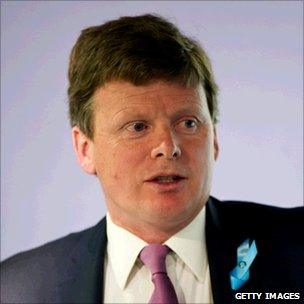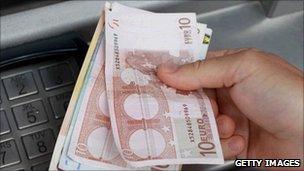Whaling body passes reforms on 'cash for votes'
- Published

Richard Benyon: a "fantastic achievement" that will help the IWC to modernise
The International Whaling Commission (IWC) has approved measures designed to prevent past "cash for votes" scandals from happening again.
Countries will have to pay membership fees by bank transfer from government accounts, enabling traceability.
Previously, delegates have been able to turn up and pay in cash.
Observers were pleased the measures passed, though some were dismayed that plans to give non-governmental groups a bigger role were discarded.
Deliberations on the package - proposed by the UK - took an entire day out of the four scheduled for this meeting, and were eventually passed by consensus.
"This is a fantastic achievement that will modernise the IWC, bringing it in to line with other important international bodies, and give it real credibility," said UK Environment Minister Richard Benyon.
"We have been working on these proposals for a year and it is a credit to the UK that we have had them passed without needing a vote."
The measures should also improve communication, with meeting reports issued within two months rather than up to a year, as currently, and more information publicly available on the IWC's website.
Cash memory
But the most controversial element proved to be the money.
Several developing country delegations said their governments tended to provide money only a few days before meetings began, so bank transfer meant the money would arrive after the meeting had begun.
Delegations are unable to vote until fees have been paid.
A number argued for the use of bankers' drafts instead. This was received with some scepticism by some western observers, who believed some delegations were trying to maintain the capacity to pass on funds from a third party easily, as bankers' drafts are anonymous.
Eventually a compromise was found, enabling the IWC secretariat to accredit delegates if it is sure that payment has been initiated.

There were different views about what should replace the cash payments that some nations use
Daven Joseph, the IWC commissioner for St Kitts and Nevis, said he regretted the amount of time spent on these discussions but it had been necessary.
"We have been establishing the rules of procedure, and we have to be very careful in how those rules are established," he told BBC News.
"In some of our countries, whaling has never been given a top priority when it comes to accessing funds from the treasury."
Environmental groups said they were generally pleased that the measures had passed.
"This is a good day for whales and the commission established to protect them; everyone wins," said Patrick Ramage, director of the Global Whale Programme of the International Fund for Animal Welfare (Ifaw).
"These rule changes represent real progress as the IWC migrates into the 21st Century - a closed whalers' club is becoming a more credible commission, promoting whale conservation not commercial whaling."
Europe's split
However, Mr Ramage and many of his peers were disappointed that proposals to give non-governmental organisations (NGOs) more involvement in the IWC's formal discussions, as they have in many other international institutions, fell along the way.
Currently, six people from the NGO community - three from the pro-whaling side, and three of their opponents - are allowed to speak for five minutes each.
This component was jettisoned before the main negotiations began, a casualty of internal European Union discussions.
All EU members except Denmark supported greater NGO involvement.
But the European Commission wants to have the bloc act in unison where possible; and the UK agreed that having the proposal put forward as an EU document would give it more leverage.
But the only way to get the Danes on board was to abandon the section on NGOs. In the IWC, Denmark represents not itself, but Greenland, a whaling territory.
Earlier in the day, Danish whaling commissioner Ole Samsing had explained his opposition by referring to the Sea Shepherd Conservation Society, which is barred from the IWC meeting but which has been holding demonstrations outside.
"We've seen how fanatical and irresponsible some NGOs can be," he told delegates.
"I know they're not accredited to this organisation, but nevertheless they're representing some radical point of view so there is a reason for restricted treatment of NGOs here."
The great irony of this process was that in the end the proposal could not be admitted as an EU document on procedural grounds, as the EU is not a member of the commission.
- Published13 July 2011
- Published13 July 2011
- Published12 July 2011
- Published10 July 2011